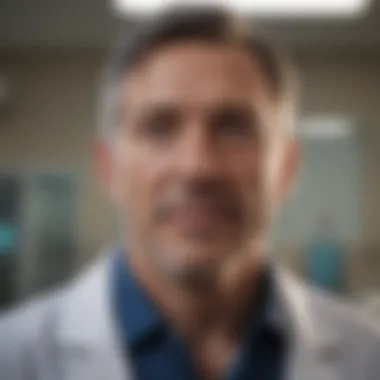Exploring the Impact of Alan Nieder, MD on Healthcare


Intro
Alan Nieder, MD, stands as a significant figure within the medical community, embodying the intricate relationship between education, research, and practical application in healthcare. As we dive into this exploration of his contributions, it's essential to recognize that his journey is a tapestry woven with threads of dedication, intellectual curiosity, and a relentless pursuit of knowledge.
From his educational roots to his current influence, Alan Nieder has continually strived to bridge the gap between theory and practice. His commitment to patient care is not merely a professional duty; it's a calling that encapsulates his entire career. In a rapidly evolving medical landscape, understanding Nieder's role can provide us with valuable insights into how individual contributions can collectively shape healthcare paradigms.
By analyzing various facets of his work—from groundbreaking research initiatives to involvement in medical education—we can unveil his noteworthy impacts. In turn, readers will appreciate the nuances of how one physician's efforts can transform patient experiences and inform future practices in medicine.
As we journey through the sections that follow, we will outline significant milestones in Nieder's career. Our aim is to foster a broader comprehension of his influence and the relevant implications for the fields of research, education, and patient care.
Prologue to Alan Nieder,
The medical landscape is constantly evolving, and the contributions of individuals like Alan Nieder, MD, play a pivotal role in shaping the way healthcare is delivered. This section lays the groundwork for understanding his multifaceted impact in the medical field. By exploring Dr. Nieder's journey, we can appreciate the unique blend of clinical practice, research, and education he embodies.
The importance of delving into the life and contributions of Alan Nieder lies not just in acknowledging a successful career, but in recognizing the myriad benefits his work offers to patients, healthcare professionals, and the broader community. The synergy between his clinical expertise and academic pursuits sheds light on how innovation in medicine can emerge from a passion for teaching and mentorship.
In this section, we will discuss key elements including his early life, educational achievements, and how they laid a solid foundation for his future endeavors. Understanding these formative experiences gives us insight into how Dr. Nieder approaches patient care and collaborates with peers, ultimately enhancing the quality of healthcare practices.
Background and Early Education
Alan Nieder's story begins in a small town, where a fascination with science sparked at an early age. Growing up in an environment that encouraged curiosity, he often found himself engrossed in medical literature or shadowing local physicians. This early exposure to the medical field developed a keen interest in biology and health sciences, setting the stage for his educational journey.
He pursued his undergraduate studies at a well-respected university, immersing himself in courses that ranged from anatomy to ethics in healthcare. This academic foundation was not merely about absorbing knowledge; it was also about cultivating critical thinking and ethical reasoning skills that would prove essential in his future medical practice. Here, he honed the ability to not only understand the human body but also appreciate the complexities of patient interactions.
Medical Degree and Specialization
After completing his undergraduate studies, Alan Nieder entered medical school, where his passion for medicine intensified. The transition from theory to real-world application was both exhilarating and demanding. He found himself captivated by the nuances of patient care and particularly drawn to specialties requiring both analytical thought and hands-on skills.
During medical school, Dr. Nieder specialized in internal medicine, choosing to focus on this field because of its comprehensive nature. It dealt with diagnosis and treatment, requiring a strong understanding of the human body and fine attention to the subtleties of patient symptoms. His commitment did not stop with simply earning his degree but extended into residency, where he further sharpened his skills under the guidance of esteemed mentors. Who better to learn from than those who had cemented their own legacies in medicine?
In essence, Alan Nieder's medical education reflects a journey marked by hard work, a thirst for knowledge, and an unwavering commitment to making a difference in the lives of his patients. Through each stage of his educational path, he has built a robust framework of knowledge and skills that continues to influence his work today.
Clinical Practice Overview
Understanding clinical practice is crucial in the context of this article, as it helps illuminate the hands-on aspect of medicine that Alan Nieder, MD, is deeply involved in. The clinical practice serves as the backbone of healthcare, bridging the gap between theoretical knowledge obtained during education and the real-world application of that knowledge in patient care. By discussing Nieder’s contributions in this area, we highlight the significance of providing quality care, improving patient outcomes, and fostering a collaborative environment among healthcare professionals.
Effective clinical practice extends beyond just treating patients. It encompasses a myriad of roles and responsibilities that each healthcare professional must navigate. It's about the intricate web of interactions with patients, colleagues, and other healthcare entities that constitute a successful practice today.
Roles and Responsibilities
Alan Nieder, MD, occupies a multifaceted role in the healthcare arena. His responsibilities span various domains, from direct patient care to administrative duties. He ensures comprehensive evaluations and personalized treatment plans tailored to unique patient needs. Here's a deeper dive into his responsibilities:
- Direct Patient Care: Dr. Nieder's primary focus is on patients. He conducts thorough examinations, diagnoses ailments, and formulates tailored treatment strategies. His approach is underscored by a deep understanding of patient histories and the latest medical advancements.
- Team Collaboration: Medicine is rarely a solo endeavor. Nieder actively collaborates with nurses, pharmacists, and specialists to coordinate comprehensive care plans. This teamwork ensures that patient needs are met through an integrated approach.
- Patient Education: Dr. Nieder believes that informed patients make better health decisions. He educates patients about their conditions, treatment options, and necessary lifestyle changes, thereby empowering them in their health journey.
- Quality Assurance: Monitoring treatment effectiveness and adhering to medical guidelines is paramount. Dr. Nieder consistently reviews patient outcomes and applies findings to optimize processes within his practice. Such reflection fosters continuous improvement.
Innovative Techniques in Patient Care
Nieder is not just another cog in the healthcare system; he is a pioneer in innovative patient care techniques. He embraces technological advancements to improve treatment efficiencies and patient experiences. Some standout innovations include:


- Telemedicine: Recognizing the need for accessible care, Nieder incorporates telehealth into his practice. This programming allows patients to consult with him from the comfort of their homes, enhancing access to healthcare services, especially for those in remote areas.
- Data Analytics: Leveraging data analytics, he identifies patterns and trends in patient care that are otherwise unnoticed. By analyzing patient histories and treatments, he has been able to refine protocols that result in better outcomes.
- Patient-Centric Approaches: Rather than a one-size-fits-all paradigm, Nieder emphasizes tailored treatment. By considering the holistic well-being of patients, he advocates for therapies that align with individual values and preferences.
"The best care is that which considers not just the illness but the person behind it."
Through these techniques, Alan Nieder’s contributions to clinical practice not only enhance the immediate patient experience but also push the boundaries of what is possible in healthcare delivery. In doing so, he ensures each patient’s voice and needs are heard and understood, representing a shift toward more personalized and effective care.
Research Contributions
Research contributions stand as a cornerstone in the field of medicine, particularly in the context of Alan Nieder, MD. A physician's ability to intertwine clinical practice with groundbreaking research can spell the difference between conventional treatment options and advanced medical breakthroughs. Nieder's research efforts have not only broadening the horizons of medical knowledge but have also enhanced practical applications that directly affect patient care. The significance of this section lies in illuminating how research fosters innovation and refinement in healthcare practices.
Key Areas of Research
Alan Nieder has devoted considerable energy toward several pivotal research areas that resonate with current and future medical practices. Notably, his work in clinical trials for novel therapeutic approaches has provided a gateway to treatments that were once considered elusive. A few examples of these key areas include:
- Oncology: Investigating the cellular mechanisms of cancer progression, focusing on personalized medicine and targeted therapies.
- Cardiology: Exploring innovative strategies for heart disease management, including lifestyle interventions and pharmacological advancements.
- Neurology: Conducting studies on neurodegenerative conditions, aiming to reduce the progression of diseases such as Alzheimer’s.
Each of these areas presents not just data, but actionable insights that can be utilized in healthcare settings around the world.
Collaborative Studies and Publications
Collaboration is integral to impactful research, and Alan Nieder has engaged in numerous cooperative efforts that have yielded substantial findings. His partnership with various medical institutions has led to extensive publications in renowned journals, emphasizing the value of shared knowledge.
For instance, one notable study published in the Journal of Clinical Oncology examined the efficacy of combined immunotherapy treatments in advanced-stage cancer patients. This work mirrors Nieder’s commitment to breaking new ground through academic partnerships and highlighting the importance of multidisciplinary teamwork in research endeavors.
"Research is not just about the individual; it’s about the collective impact we can make together through shared knowledge and experience." - Alan Nieder, MD
Impact on Current Medical Practices
The ripple effect of Nieder's research contributions is felt throughout various medical practices today. By synthesizing data from his studies, healthcare providers can refine treatment protocols, ensuring that they are aligned with the latest developments in science. The following points encapsulate this impact:
- Evidence-Based Practices: Many of his research outcomes have laid the groundwork for developing guidelines that healthcare professionals rely on to make informed decisions.
- Training and Education: His findings not only influence treatment approaches but also serve as teaching material in medical education, bridging the gap between theory and practice.
- Patient Outcomes: Enhanced methodologies from his research lead directly to improved patient outcomes, as they often result in more effective and individualized treatment plans.
Educational Initiatives
Alan Nieder, MD, has made significant strides in the realm of education, influencing not only his peers but also the next generation of healthcare professionals. His efforts in educational initiatives highlight a deep understanding of the importance of knowledge transfer within the medical community. These initiatives serve a dual purpose: ensuring that emerging practitioners are well-equipped with clinical skills and fostering a culture of lifelong learning. The healthcare landscape is in constant flux, requiring ongoing education to adapt and excel.
Teaching and Mentorship
Dr. Nieder’s role as a mentor is nothing short of commendable. Through hands-on teaching methods, he emphasizes the value of real-world cases that can ignite passion and critical thinking in students. His approach to mentorship goes beyond traditional teaching; it’s about nurturing relationships that can last through careers.
In his discussions, he often brings pointed examples: "It's vital to share our experiences, the good, the bad, and the ugly. That’s how we learn. We cannot just throw textbooks at students and hope for the best." This wisdom resonates deeply, as he believes in creating an environment where questions are encouraged and mistakes are seen as growth opportunities.
Key components of his mentorship include:
- Personalized Guidance: Understanding individual strengths and weaknesses to foster development.
- Interdisciplinary Collaboration: Encouraging students to learn from different medical fields to broaden their perspectives.
- Feedback Loops: Creating a culture of constructive criticism that helps refine skills.
Moreover, his mentorship style is infused with a genuine compassion for his students, recognizing that medical training can be intensely challenging.


Public Speaking Engagements
Dr. Nieder is not just an educator within the walls of hospitals or classrooms, but also takes his message to audiences far and wide. His public speaking engagements are a testament to his commitment to education on a larger scale. Whether addressing medical conferences or community forums, he utilizes these opportunities to discuss pressing healthcare issues and innovations.
By actively engaging with both medical professionals and laypeople, he bridges the gap between complex medical concepts and public understanding. One of his notable quotes is, > "Knowledge should not be fenced off. It must be shared to cultivate a healthier society.”
His speeches often focus on key themes such as:
- Advancements in Medical Science: Discussing cutting-edge treatments and technologies that can transform patient care.
- Health Education: Promoting awareness about public health issues to empower communities.
- Ethics in Medicine: Advocating for ethical considerations amidst rapid medical advancements.
Through these engagements, Dr. Nieder continues to inspire both seasoned practitioners and newcomers, emphasizing that education is a powerful tool in the fight for improved patient outcomes. His insight and ability to connect complex ideas to everyday experiences foster a deeper appreciation of the healthcare field.
Professional Affiliations and Contributions
Professional affiliations and active contributions are cornerstones of effective medical practice. For Alan Nieder, MD, these elements play a significant role not only in his career but also in shaping the broader medical landscape. These affiliations provide a vital link between current practices and evolving standards in healthcare, ensuring professionals remain conversant with the latest trends and innovations.
Membership in Medical Associations
Alan Nieder’s memberships in various medical associations underscore his commitment to continuous professional development and public health advocacy. Being aligned with organizations such as the American Medical Association and the American College of Physicians facilitates networking with peers and thought leaders. This engagement opens doors for collaboration on research projects, enabling the exchange of ideas that can lead to improved patient outcomes.
Moreover, belonging to these groups often grants access to valuable resources that keep practitioners informed about legislative changes and clinical guidelines. Memberships can also drive participation in continuing education opportunities, which is essential in a field that constantly evolves due to new research and technological advancements. This is particularly crucial for a physician in a specialized field, like Nieder, who must integrate fresh knowledge into his practice to provide top-tier patient care.
"Membership in medical associations not only unites professionals but also cultivates a culture of learning and innovation in healthcare."
Advisory Roles and Community Engagement
In addition to his memberships, Dr. Nieder is involved in various advisory roles that reflect his dedication to community engagement. These positions allow him to influence health policy and advocacy on a local, state, or even national level. For instance, serving on the board of a health initiative relevant to his specialty can facilitate important discussions about resource allocation and community health strategies.
Community engagement is not limited to professional conferences; it also extends to public health workshops and seminars that Nieder often leads. He prioritizes educating patients about their treatment options and health conditions, making himself accessible to answer questions and dispel myths about medical practices. Such outreach efforts contribute to a more informed public, which in turn encourages better health management among individuals.
The balance of advisory roles and grassroots involvement exemplifies Dr. Nieder’s dual commitment: to advance professional practices while nurturing community health. This nuanced approach to patient care and public service greatly enriches his overall contributions to the field.
Patient-Centered Care Philosophy
Patient-centered care represents a fundamental shift in the way healthcare is approached. Rather than focusing solely on the clinical aspects of treatment, this philosophy emphasizes the importance of engaging patients in their own care. Alan Nieder, MD, exemplifies this belief, demonstrating through his practice the profound benefits that come from prioritizing the patient’s experience and needs.
The significance of adopting a patient-centered care philosophy lies in its potential to improve health outcomes, enhance patient satisfaction, and foster a more trusting doctor-patient relationship. When patients feel heard and valued, they are more likely to comply with treatment plans, which can lead to better health results. Furthermore, such an approach helps in acknowledging and respecting the individuality of each patient, considering their personal circumstances, preferences, and values. This tailored approach not only addresses physical health but also recognizes the emotional and psychological dimensions of well-being.
Holistic Approach to Treatment
In the realm of patient-centered care, the holistic approach takes precedence. This method is about treating a person as a whole rather than merely addressing specific symptoms or ailments. It encompasses various dimensions of health, including physical, emotional, social, and spiritual aspects. Understanding this can make all the difference in patient care.
Alan Nieder’s commitment to holistic care translates into practical applications in his clinical practice. He collaborates with various specialists—from mental health professionals to nutritionists—to build a comprehensive treatment plan that reflects a patient’s unique context. This interconnectedness not only addresses immediate health issues but also fosters long-term wellness. It allows for a deeper understanding of the factors that contribute to a patient’s health, like their lifestyle choices and socio-economic background.
- Benefits of a Holistic Approach:
- Comprehensive Wellness: Patients often experience greater satisfaction and a sense of control over their health.
- Improved Communication: A holistic approach encourages open dialogue, ensuring that patients can express their concerns without feeling rushed.
- Better Health Outcomes: By considering the full spectrum of influences on health, practitioners can create more effective interventions.


"By involving patients in their care journey, we invite them to be active participants in their own healing process, thus reinforcing their sense of agency and responsibility."
Advocacy for Patient Rights
Another critical aspect of patient-centered care is the active advocacy for patient rights. Alan Nieder believes that every individual has the right to be treated with dignity and respect, along with the right to informed decision-making in their healthcare journey.
Advocating for patient rights involves ensuring that patients are informed about their treatment options and the implications of their decisions. This process of education is essential in promoting patient autonomy, as patients who understand their conditions are better equipped to make informed choices about their care.
- Key Aspects of Patient Advocacy:
- Informed Consent: Patients must be provided with all necessary information to understand the risks and benefits of proposed treatments.
- Confidentiality: Upholding patient privacy is non-negotiable and fundamental for trust.
- Access to Care: Advocates strive to eliminate barriers to healthcare, ensuring equity.
With such advocacy, the healthcare landscape transforms into a more equitable model, one where patients are empowered. Alan Nieder’s efforts in educating both patients and peers about rights and responsibilities place him at the forefront of fostering a healthcare environment that truly resonates with the ideals of patient-centered care.
Future Directions in Medicine
The evolution of medical practices has always been steeped in the promise of new possibilities. Recognizing this fact, it becomes clear that the future of medicine is a tapestry woven from advancing technology, innovative methodologies, and an ever-expanding understanding of patient needs. In this context, Alan Nieder, MD, stands as a beacon of forward-thinking ideals, shaping how we interpret and implement these developments in real-life scenarios. By engaging with this topic, readers can grasp the implications of emerging trends, enhancing not only patient care but also the entire healthcare system.
Emerging Trends and Technologies
In recent years, the landscape of healthcare has flourished with trends that harness technology for better outcomes. Alan Nieder has underscored the importance of integrating digital health solutions, such as telemedicine and wearable technologies, into everyday practice.
- Telehealth allows practitioners to reach patients beyond geographical boundaries, breaking down barriers that previously hindered care accessibility.
- Wearable devices, like fitness trackers and health monitors, provide real-time data, enabling proactive health management that empowers patients in their own journeys.
- Artificial Intelligence is being tapped into for predictive analytics, which can identify potential health risks before they manifest, substantially improving preventive care.
Such advancements democratize healthcare while simultaneously tailoring treatment to individual needs. Embracing these technologies not only modernizes practice but also aligns with the holistic care philosophy that Nieder promotes.
Potential Impact on Healthcare Delivery
The ripple effects of these emerging trends stretch far and wide, signaling a shift in healthcare delivery that is not just about treating ailments but optimizing health overall. Such shifts echo the vision of practitioners like Nieder exemplifying a robust and agile healthcare model where adaptability is paramount.
- Enhanced Patient Engagement: With tools that enhance communication and information sharing, patients feel more involved and informed about their health. This inclusion often leads to better adherence to recommended treatments.
- Cost-Effectiveness: By reducing hospital visits through remote monitoring and telehealth consultations, healthcare expenses can be trimmed significantly—a vital consideration in today's economy.
- Improved Health Outcomes: Studies show that leveraging technologies in patient care can lead to improved management of chronic diseases and reduced readmission rates, ultimately saving lives and resources.
These transformations pose both exciting prospects and challenges. It is crucial for healthcare professionals to stay abreast of these developments to maintain a high quality of care.
"With each advancement, we have the opportunity to elevate the standard of care provided to our patients, putting their wellness at the forefront."
As we look to the horizon, the interplay between emerging technologies and patient delivery models will undoubtedly dictate the future course of healthcare, making it imperative for professionals to embrace these changes wholeheartedly.
The End
The conclusion serves as the linchpin of the discussion on Alan Nieder, MD, encapsulating his various contributions to the medical field. It is not merely a recapitulation of previous sections; rather, it aims to synthesize insights and reflect on the breadth of his impact. An effective conclusion provides closure while also underscoring the importance of Nieder’s work, fostering a deeper appreciation of his holistic approach to medicine.
Summary of Key Contributions
In summarizing the key contributions of Alan Nieder, we must focus on several pivotal elements:
- Innovative Patient Care Techniques: Nieder's commitment to patient-centered care and his adoption of cutting-edge methodologies have transformed the way healthcare is delivered. His emphasis on personalized treatment plans not only enhances patient satisfaction but also improves clinical outcomes, making healthcare more effective overall.
- Research and Collaboration: His active role in collaborative studies has greatly enriched medical literature, paving the way for new perspectives and techniques. These efforts have not only benefited his patients directly but have also provided the wider medical community with invaluable insights that influence practices globally.
- Educational Initiatives: Nieder's dedication to teaching resonates through his mentorship of young medical professionals. By fostering a culture of continuous learning and growth, he amplifies the impact of his knowledge beyond his immediate practice, shaping future generations of healthcare providers.
Final Reflections on Medical Practice
As we consider Alan Nieder, MD's contributions, it becomes evident that his philosophy transcends traditional boundaries in medical practice.
- Commitment to Advocacy: Nieder exemplifies an unwavering advocacy for patient rights, ensuring that each individual is treated with respect and dignity. His efforts highlight the ethical responsibility that healthcare providers hold in fostering trust and transparency within professional relationships.
- The Integration of Research and Practice: His work elegantly bridges the gap between clinical research and patient care. By prioritizing evidence-based practices, he not only honors the science of medicine but also empowers patients through informed choices.
In essence, the narrative of Alan Nieder, MD, is a testament to what can be achieved when passion and professionalism converge. His journey signifies that the future of medicine hinges on innovation, compassion, and a relentless pursuit of knowledge. As the healthcare landscape continues to evolve, Nieder’s legacy offers a roadmap for navigating its complexities, ensuring that patient welfare remains at the forefront of every decision.















